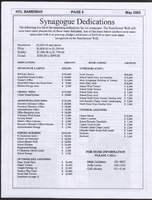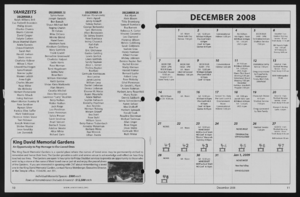Search the Special Collections and Archives Portal
Search Results

Transcript of interview with Ron Lurie by Barbara Tabach, June 5, 2015
Date
Archival Collection
Description
Interview with Ron Lurie by Barbara Tabach on June 5, 2015. In this interview, Lurie discusses his family and his time in politics, campaigning for office, and some of his accomplishments while in office as mayor and in the city council. He also talks about growing up in Las Vegas and attending Las Vegas High School, and working for his father, Art Lurie, in the grocery store business.
Ron Lurie was a rambunctious teenager when the Lurie family moved to Las Vegas from California. He adapted quickly to Las Vegas and made fast friends. He is a 1958 graduate of Las Vegas High School. His father, Art Lurie, a supermarket businessman, was also a well-known professional boxing judge and a former Nevada Athletic Commission chair. In 1987 Ron became the first person of Jewish ancestry to be elected Mayor of Las Vegas. Previously, he was fourteen year member of the Las Vegas City Council and served on many community boards and commissions. Since political office was not a fulltime position, Ron's career path developed in a couple of different ways. He tells the story of becoming a butcher and the opportunities he experienced becoming a successful salesman of gaming machines for Si Redd, IGT and others. His over three decade gaming career continues as of this oral history. He is executive vice president and general manager of Arizona Charlie's Decatur location. In this oral history he reflects on some of his political accomplishments as mayor and city councilman. He also served six years on the State of Nevada Wildlife Commission and is a member of the Fraternity of the Desert Bighorn.
Text

Transcript of interview with Michael S. Mack by Barbara Tabach, May 20, 2015
Date
Archival Collection
Description
In this oral history Michael Mack discusses his early memories of Las Vegas such as attending the Fifth Street School and activities him and his friends participated in. The interview also includes his memories of different members of the Mack family and their activities. He reminisces about his many visits to the Flamingo Hotel as well as being taken by his parent to floor shows. He also discusses what it was like to grow up Jewish in Las Vegas and the way Jews helped build the community.
Text
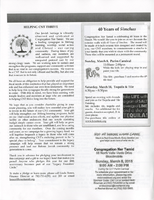
Newsletter from Congregation Ner Tamid, March 2015
Date
Archival Collection
Description
Newsletter from Congregation Ner Tamid, March 2015
Text
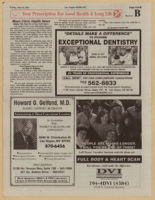
Las Vegas Israelite newspaper, Section B, June 22, 2001
Date
Description
Issue of the Las Vegas Israelite newspaper.
Text


Jack Weinstein and Polly Weinstein interview, April 12, 2018: transcript
Date
Archival Collection
Description
Tower of Jewels is one of those iconic Las Vegas businesses that continues to thrive. At the time of this interview, Jack Weinstein is in his nineties and “retired.” With him is his daughter Polly Weinstein, who in addition to being involved in the business management has her own custom designed jewelry line, aptly named The Jeweler’s Daughter. As the youngest of six children born to Jewish Russian immigrants Joseph and Pauline (Polly is named for her grandmother), Jack was raised in a dangerous neighborhood of Detroit, Michigan. His youthful enterprise included collaborating and then splitting up with his brothers in a jewelry business, before eventually moving west to Los Angles in the early 1960s. On his own, Jack became a wholesale salesperson representing lines of watches to other businesses. Included in his list of clients was Al Sanford’s Tower of Jewels in Las Vegas. The two became friends and Al suggested setting up a partnership between Al’s son and Jack in 1964. Eventually
Text

Mara Braun interview, September 9, 2019: transcript
Date
Archival Collection
Description
Interviewed by Barbara Tabach. Mara Braun, a native of Puerto Rico, has lived in Las Vegas since 1975. She is the owner/operator of a successful event and catering business. Mara married Abe Braun and raised their children in both Latinx and Jewish traditions.
Text
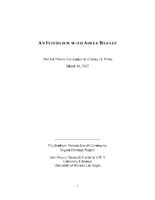
Transcript of interview with Adele Baratz by Claytee D. White, March 19, 2007
Date
Archival Collection
Description
Interview with Adele Baratz by Claytee White on March 19, 2007. In this interview, Baratz talks about her parents who came to the United States as teenagers from Russia and eventually settled in Las Vegas after a short time in California. She discusses the Jewish community in Las Vegas when she was growing up, and her father's job selling bootlegging supplies, then as a real estate broker, then as a bar owner. Baratz attended the Fifth Street Grammar School, which was built after a fire destroyed the original school, and Las Vegas High School. As a teenager, she worked at Nellis as a messenger and in the rations department, then went to nursing school in Baltimore at Sinai Hospital. She talks about her father's bar, "Al's Bar," that was popular with Union Pacific Railroad workers, and how the bar was forced out for the building of the Golden Nugget. Baratz recounts where her family lived, the growth of the Jewish community, and building the first synagogue on Carson Street.
Text

